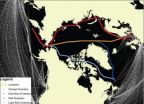(Press-News.org) As the ice-capped Arctic Ocean warms, ship traffic will increase at the top of the world. And if the sea ice continues to decline, a new route connecting international trading partners may emerge -- but not without significant repercussions to climate, according to a U.S. and Canadian research team that includes a University of Delaware scientist.
Growing Arctic ship traffic will bring with it air pollution that has the potential to accelerate climate change in the world's northern reaches. And it's more than a greenhouse gas problem -- engine exhaust particles could increase warming by some 17-78 percent, the researchers say.
James J. Corbett, professor of marine science and policy at UD, is a lead author of the first geospatial approach to evaluating the potential impacts of shipping on Arctic climate. The study, "Arctic Shipping Emissions Inventories and Future Scenarios," is published in Atmospheric Chemistry and Physics.
Corbett's coauthors include Daniel A. Lack, from the National Oceanic and Atmospheric Administration (NOAA) Earth System Research Laboratory in Boulder, Colo.; James J. Winebrake, of the Rochester Institute of Technology; Susie Harder of Transport Canada in Vancouver, British Columbia; Jordan A. Silberman of GIS Consulting in Unionville, Pa.; and Maya Gold of the Canadian Coast Guard in Ottawa, Ontario.
"One of the most potent 'short-lived climate forcers' in diesel emissions is black carbon, or soot," says Corbett, who is on the faculty of UD's College of Earth, Ocean, and Environment. "Ships operating in or near the Arctic use advanced diesel engines that release black carbon into one of the most sensitive regions for climate change."
Produced by ships from the incomplete burning of marine fuel, these tiny particles of carbon act like 'heaters' because they absorb sunlight -- both directly from the sun, and reflected from the surface of snow and ice. Other particles released by ship engines also rank high among important short-lived climate forcers, and this study estimates their combined global warming impact potential.
To better understand the potential impact of black carbon and other ship pollutants on climate, including carbon dioxide, methane and ozone, the research team produced high-resolution (5-kilometer-by-5-kilometer) scenarios that account for growth in shipping in the region through 2050, and also outline potential new Arctic shipping routes.
Among the research team's most significant findings:
Global warming potential in 2030 in the high-growth scenario suggests that short-lived forcing of ~4.5 gigatons of black carbon from Arctic shipping may increase the global warming potential due to ships' carbon dioxide emissions (~42,000 gigagrams) by some 17-78 percent.
Ship traffic diverting from current routes to new routes through the Arctic is projected to reach 2 percent of global traffic by 2030 and to 5 percent in 2050. In comparison, shipping volumes through the Suez and Panama canals currently account for about 4 percent and 8 percent of global trade volume, respectively.
A Northwest Passage and Northeast Passage through the Arctic Ocean would provide a distance savings of about 25 percent and 50 percent, respectively, with coincident time and fuel savings. However, the team says tradeoffs from the short-lived climate forcing impacts must be studied.
To calculate possible benefits of policy action, the study provides "maximum feasible reduction scenarios" that take into account the incorporation of emissions control technologies such as seawater scrubbers that absorb sulfur dioxide emitted during the burning of diesel fuel. Their scenario shows that with controls, the amount of Arctic black carbon from shipping can be reduced in the near term and held nearly constant through 2050.
"To understand the value of addressing short-lived climate forcers from shipping, you need to know the impacts of these emissions, the feasibility and availability of technologies that could be put in place to reduce these impacts, and then engage the policy-making community to debate the evidence and agree on a plan," Corbett notes. "Our hope is that this study will enable better communication of emerging science with policy makers and aid the eight Arctic Council nations with climate policy."
INFORMATION:
Corbett also has led recent studies to determine the global health effects of shipping, and more recently, a comparison of the daily release of oil from the Deepwater Horizon oil spill and Americans' daily energy use.
As Arctic warms, increased shipping likely to accelerate climate change
2010-10-26
ELSE PRESS RELEASES FROM THIS DATE:
UF research gives clues about carbon dioxide patterns at end of Ice Age
2010-10-26
GAINESVILLE, Fla. — New University of Florida research puts to rest the mystery of where old carbon was stored during the last glacial period. It turns out it ended up in the icy waters of the Southern Ocean near Antarctica.
The findings have implications for modern-day global warming, said Ellen Martin, a UF geological sciences professor and an author of the paper, which is published in this week's journal Nature Geoscience.
"It helps us understand how the carbon cycle works, which is important for understanding future global warming scenarios," she said. "Ultimately, ...
Purdue-led research team finds Haiti quake caused by unknown fault
2010-10-26
WEST LAFAYETTE, Ind. - Researchers found a previously unmapped fault was responsible for the devastating Jan. 12 earthquake in Haiti and that the originally blamed fault remains ready to produce a large earthquake.
Eric Calais, a Purdue University professor of earth and atmospheric sciences, led the team that was the first on the ground in Haiti after the magnitude 7.0 earthquake, which killed more than 200,000 people and left 1.5 million homeless.
The team determined the earthquake's origin is a previously unmapped fault, which they named the LÄogëne fault. The newly ...
Substantial consumption of fluoride increases chance of mild fluorosis
2010-10-26
CHICAGO, Oct. 25, 2010 – Young children who consume substantial amounts of fluoride through infant formula and other beverages mixed with fluoridated water or by swallowing fluoride toothpaste have an increased chance of developing mild enamel fluorosis, according to research published in the October issue of The Journal of the American Dental Association and supported by the National Institute of Dental and Craniofacial Research. Children can continue using fluoridated water and fluoride toothpaste because fluoride has been proven to prevent tooth decay, and mild fluorosis ...
MicroRNAs dictate the Epstein-Barr virus' elaborate waiting game, cancer formation
2010-10-26
While most commonly associated with mononucleosis, Epstein-Barr virus (EBV) has been linked to many diseases that affect people long after the initial infection takes place, including some forms of cancer. In the current issue of the Journal of Biological Chemistry, scientists at The Wistar Institute describe how viral microRNA – small segments of RNA that suppress the effects of gene activity – allows EBV to hide within cells and evade the immune system. The scientists believe their findings may one day enable physicians to flush EBV out of hiding, allowing a healthy immune ...
Researchers find a stable way to store the sun's heat
2010-10-26
CAMBRIDGE, Mass. -- Researchers at MIT have revealed exactly how a molecule called fulvalene diruthenium, which was discovered in 1996, works to store and release heat on demand. This understanding, reported in a paper published on Oct. 20 in the journal Angewandte Chemie, should make it possible to find similar chemicals based on more abundant, less expensive materials than ruthenium, and this could form the basis of a rechargeable battery to store heat rather than electricity.
The molecule undergoes a structural transformation when it absorbs sunlight, putting it into ...
Listeria clever at finding its way into bloodstream, causing sickness
2010-10-26
WEST LAFAYETTE, Ind. - Pathogenic listeria tricks intestinal cells into helping it pass through those cells to make people ill, and, if that doesn't work, the bacteria simply goes around the cells, according to a Purdue University study.
Arun Bhunia, a professor of food science, and Kristin Burkholder, a former Purdue graduate student who is now a postdoctoral researcher in microbiology and immunology at the University of Michigan Medical School, found that listeria, even in low doses, somehow triggers intestinal cells to express a new protein, heat shock protein 60, ...
Modern humans emerged far earlier than previously thought
2010-10-26
An international team of researchers based at the Institute of Vertebrate Paleontology and Paleoanthropology in Beijing, including a physical anthropology professor at Washington University in St. Louis, has discovered well-dated human fossils in southern China that markedly change anthropologists perceptions of the emergence of modern humans in the eastern Old World.
The research was published Oct. 25 in the online early edition of the Proceedings of the National Academy of Sciences.
The discovery of early modern human fossil remains in the Zhirendong (Zhiren Cave) ...
'Fracking' mobilizes uranium in marcellus shale
2010-10-26
BUFFALO, N.Y. -- Scientific and political disputes over drilling Marcellus shale for natural gas have focused primarily on the environmental effects of pumping millions of gallons of water and chemicals deep underground to blast through rocks to release the natural gas.
But University at Buffalo researchers have now found that that process -- called hydraulic fracturing or "fracking"-- also causes uranium that is naturally trapped inside Marcellus shale to be released, raising additional environmental concerns.
The research will be presented at the annual meeting of ...
Study finds race, ethnicity impact access to care for children with frequent ear infections
2010-10-26
Ear infections are one of the most common health problems for children, with most kids experiencing at least one by their third birthday. Annual costs in the United States alone are in the billions of dollars.
When these infections are left untreated, complications can include hearing loss, speech problems and more severe infections that can spread to bone and brain, causing meningitis. But not all kids have the same access to medical specialists and medicines.
A new study by researchers at the David Geffen School of Medicine at UCLA and Harvard Medical School has ...
Knowledge gaps, fears common among parents of children with drug-resistant bacteria
2010-10-26
Knowledge gaps and fear — some of it unjustified — are common among the caregivers of children with a drug-resistant staph bacterium known as MRSA, according to the results of a small study from the Johns Hopkins Children Center. These caregivers thirst for timely, detailed and simple information, the researchers add.
The study's findings, published online in The Journal of Pediatrics, underscore the need for healthcare staff to do a better job in educating parents, while also addressing concerns and allaying fears, the investigators say.
"What these results really ...



